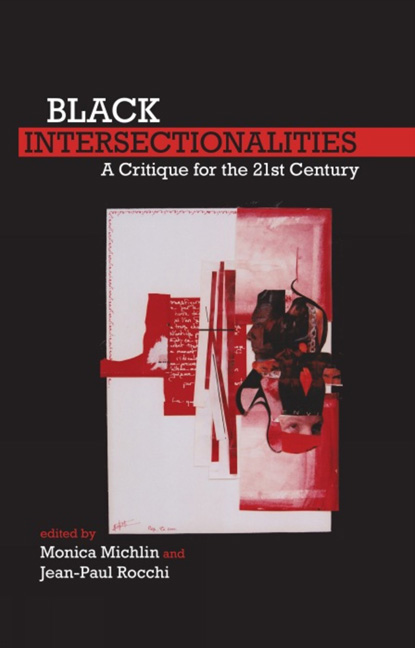Book contents
- Frontmatter
- Contents
- 1 Introduction: Theorizing for Change: Intersections, Transdisciplinarity, and Black Lived Experience
- 2 Exordium: Writing and the Relation: From Textual Coloniality to South African Black Consciousness
- I Challenging Hegemonic Gender Identities
- II Nonconformity and Narrative heorizing
- III Upsurges of Desire
- IV Epistemological Genealogies and Prospections
- Contributors
- Index
1 - Introduction: Theorizing for Change: Intersections, Transdisciplinarity, and Black Lived Experience
- Frontmatter
- Contents
- 1 Introduction: Theorizing for Change: Intersections, Transdisciplinarity, and Black Lived Experience
- 2 Exordium: Writing and the Relation: From Textual Coloniality to South African Black Consciousness
- I Challenging Hegemonic Gender Identities
- II Nonconformity and Narrative heorizing
- III Upsurges of Desire
- IV Epistemological Genealogies and Prospections
- Contributors
- Index
Summary
Intersectional Beings, Doings, and Readings: A History to Pass On and Transform
In the Spring of 2011, the Collegium for African American Research (CAAR) placed the emphasis of its ninth international conference, “Black States of Desire: Dispossession, Circulation, Transformation,” which was held in Paris, on the conditions of social transformation in the black world. It insisted on the intersection of a socioeconomic approach with a multicultural and identity-focused perspective; on the relation between theorizing processes and social transformation, between intellectual activity and political action; and on the cross-cutting relations between different communities with specific emancipatory agendas. The call for papers further explained that
[i]n the wake of Lorde's esthetical and political alliance of the self and the community, of Baldwin's desiring consciousness and ethics of inclusion, desire and the black states are together rich with conscious revolutions to come. They work as immaterial and physical orientations, symbols of shifting identifications, of the diversity of black lived experience. The black states of desire therefore set out to describe lack turned into impetus and actualization, the movement from what exists to what can be imagined and created, from words to the building stone, from statement to establishment. […] To reach the necessary coalition-building between black communities, it is necessary to consider the multiple identifications and identities that found them, and the cross-cutting issues that impact them. While revisiting the African American literary esthetics of optics, through which things unseen are made evident, contemporary writers and artists – often activists as well – such as Essex Hemphill, Assotto Saint, or Sapphire, have complied with this double agenda. Their commitment to both art and the world prolongs the organic bond between literature and sociopolitical struggles, while eschewing academic aporias, conceptualizations disconnected from black reality, or, up until recently, the delusions promised by the proclaimed advent of, in the United States, the postrace, and in South Africa, the postcolony. […] If reconnected to the social world, starting with a productive connection between disciplines […] the call for transformation from worldwide black philosophies, arts and literatures may not remain unanswered.
Proceeding from this collective work, Black Intersectionalities: A Critique for the 21st Century reflects the contemporary theorization intersecting race, gender, and sex, and the disciplines that study them. It also aims at preserving the historical interrelatedness between intellectuality and political action.
- Type
- Chapter
- Information
- Black IntersectionalitiesA Critique for the 21st Century, pp. 1 - 20Publisher: Liverpool University PressPrint publication year: 2013



